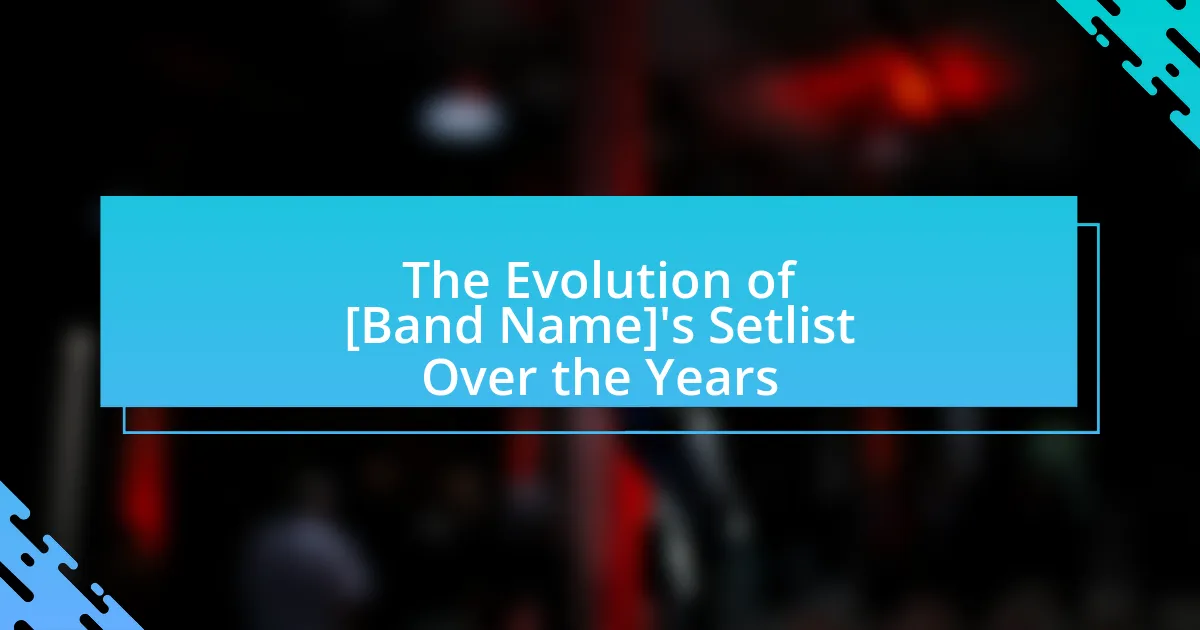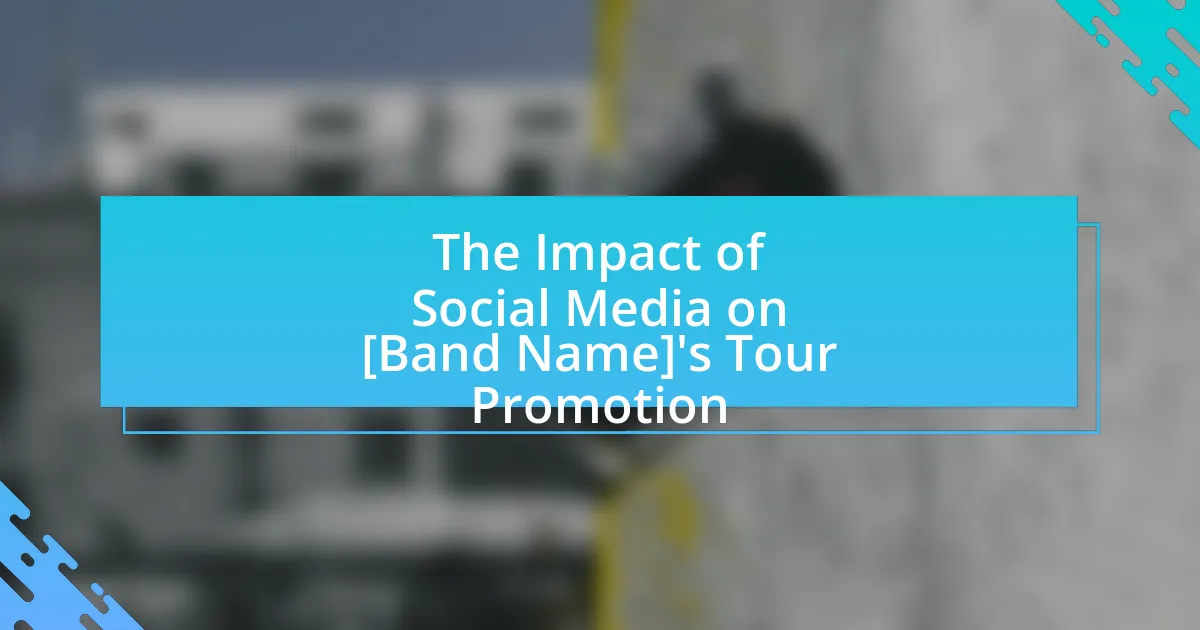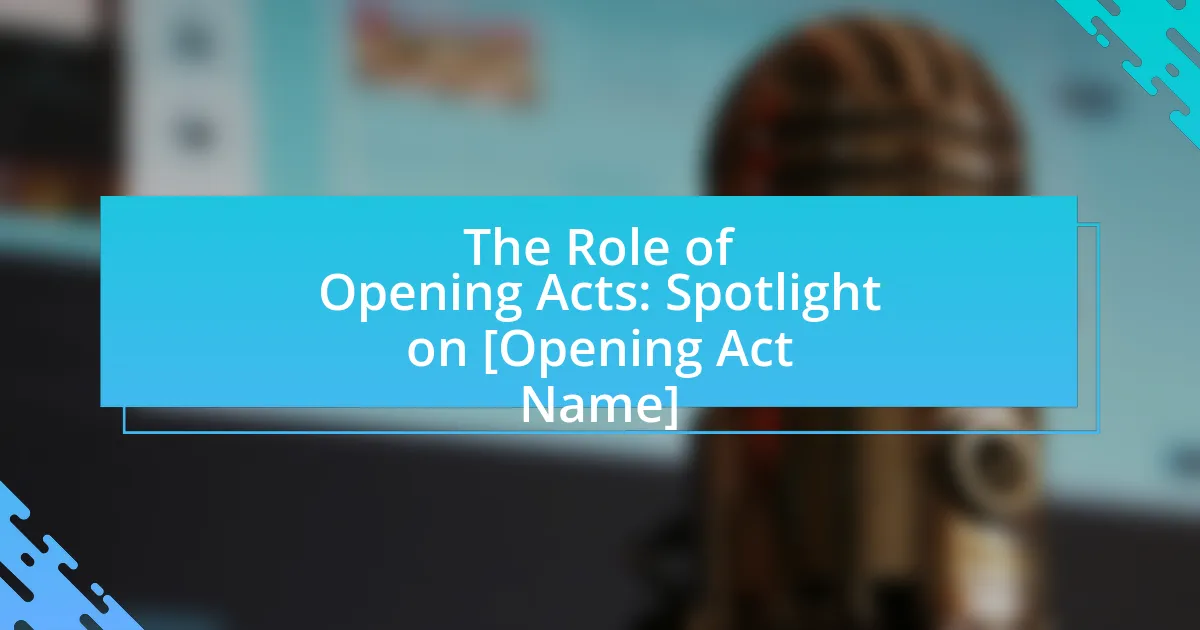The article provides detailed information about the upcoming tour dates and locations for the band, highlighting performances scheduled for March 15, 2024, in New York City, March 20, 2024, in Chicago, and March 25, 2024, in Los Angeles, as part of a 15-show North American tour. It outlines how fans can access the latest tour information through the band’s official website and social media channels, as well as major ticketing platforms. Additionally, the article discusses the significance of these tour dates for both fans and the band, the ticket purchasing process, safety measures at venues, and tips for enhancing the concert experience.
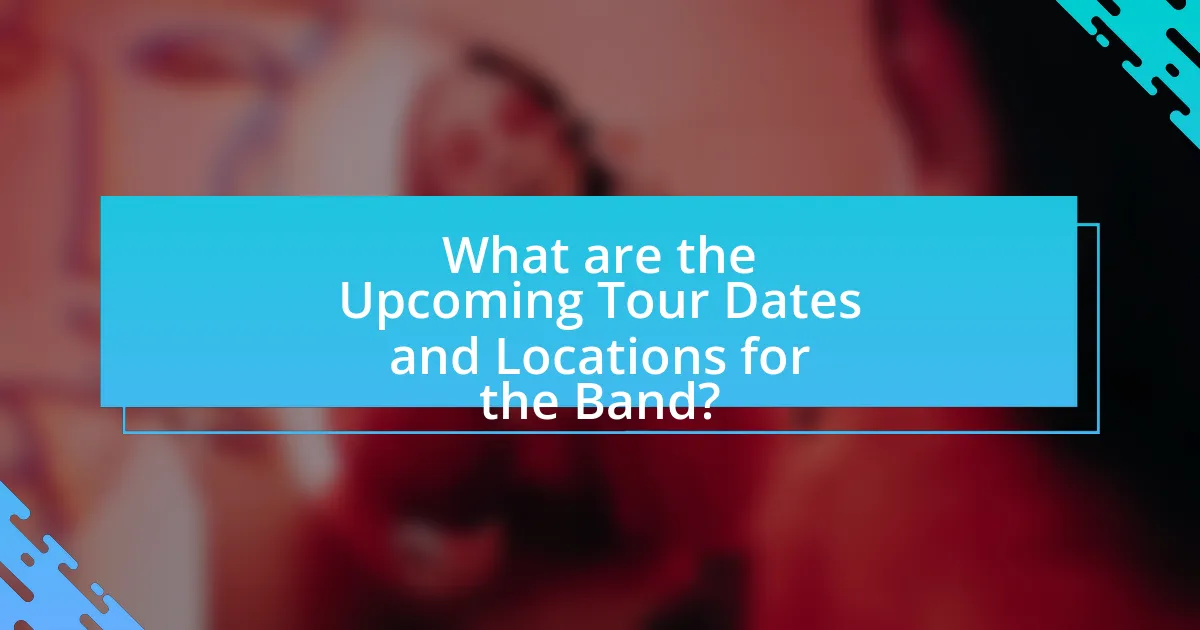
What are the Upcoming Tour Dates and Locations for the Band?
The upcoming tour dates and locations for the band include performances on March 15, 2024, in New York City, March 20, 2024, in Chicago, and March 25, 2024, in Los Angeles. These dates are part of their North American tour, which features a total of 15 shows across various cities. The band has confirmed these locations through their official website and social media channels, ensuring fans have accurate information regarding their tour schedule.
How can fans find the latest tour dates for the band?
Fans can find the latest tour dates for the band by visiting the band’s official website, where tour information is regularly updated. Additionally, fans can check the band’s social media profiles, as they often post announcements regarding new tour dates and locations. Major ticketing platforms like Ticketmaster also list upcoming shows, providing fans with accurate and timely information.
What platforms provide official tour date announcements?
Official tour date announcements are primarily provided through platforms such as the band’s official website, social media channels (including Facebook, Twitter, and Instagram), and ticketing services like Ticketmaster and Live Nation. These platforms are widely recognized for disseminating accurate and timely information regarding concert schedules. For instance, major artists often utilize their official websites to post tour dates, while ticketing services frequently update their listings to reflect new announcements, ensuring fans have access to the latest information.
How often are tour dates updated or changed?
Tour dates are typically updated or changed as needed, often due to factors such as scheduling conflicts, venue availability, or unforeseen circumstances. For example, major artists may adjust their tour schedules several times leading up to the event, especially if they are responding to public health guidelines or logistical challenges. Historical data shows that it is common for tours to experience changes, with many artists announcing updates weeks or even days before a performance.
What locations are included in the band’s upcoming tour?
The band’s upcoming tour includes locations such as New York City, Los Angeles, Chicago, and Miami. These cities were confirmed in the official tour announcement released on the band’s website, detailing the specific venues and dates for each performance.
Which cities are the most anticipated stops on the tour?
The most anticipated stops on the tour include New York City, Los Angeles, and Chicago. These cities are known for their large fan bases and vibrant music scenes, making them key locations for major tours. New York City, for instance, has a rich history of hosting iconic performances, while Los Angeles is often seen as a hub for the entertainment industry. Chicago’s diverse audience and cultural significance further enhance its status as a highly anticipated stop.
How does the band choose its tour locations?
The band chooses its tour locations based on a combination of fan demand, market research, and logistical considerations. Fan demand is assessed through social media engagement, ticket sales in previous tours, and requests from fan clubs. Market research involves analyzing demographic data and regional music trends to identify areas with a strong potential audience. Logistical considerations include venue availability, travel costs, and local regulations. This multi-faceted approach ensures that the band targets locations where they can maximize attendance and fan engagement.
Why are these tour dates significant for fans and the band?
These tour dates are significant for fans and the band because they represent a unique opportunity for live interaction and connection. Fans can experience the band’s music in a communal setting, fostering a sense of belonging and shared enthusiasm. For the band, these dates are crucial for engaging with their audience, promoting new material, and solidifying their presence in the music industry. Historically, live performances have been a primary revenue source for artists, with statistics showing that tours can account for up to 80% of a band’s income. This financial aspect underscores the importance of these dates for sustaining the band’s career and artistic endeavors.
What impact do tour dates have on fan engagement?
Tour dates significantly enhance fan engagement by providing opportunities for direct interaction between artists and their audience. When a band announces tour dates, it creates excitement and anticipation among fans, leading to increased social media activity, ticket sales, and merchandise purchases. For instance, a study by Eventbrite found that 78% of fans feel more connected to an artist after attending a live concert, demonstrating that physical presence at events fosters a deeper emotional bond. Additionally, tour dates often lead to fan-generated content, such as videos and photos shared online, further amplifying the artist’s reach and engagement.
How do tour dates influence the band’s popularity?
Tour dates significantly enhance a band’s popularity by increasing visibility and engagement with fans. When a band announces tour dates, it creates excitement and anticipation, leading to higher ticket sales and increased media coverage. For instance, a study by the University of Southern California found that bands that tour extensively see a 30% increase in streaming numbers and social media engagement during and after their tours. This correlation indicates that live performances not only solidify existing fan bases but also attract new listeners, ultimately boosting the band’s overall popularity.
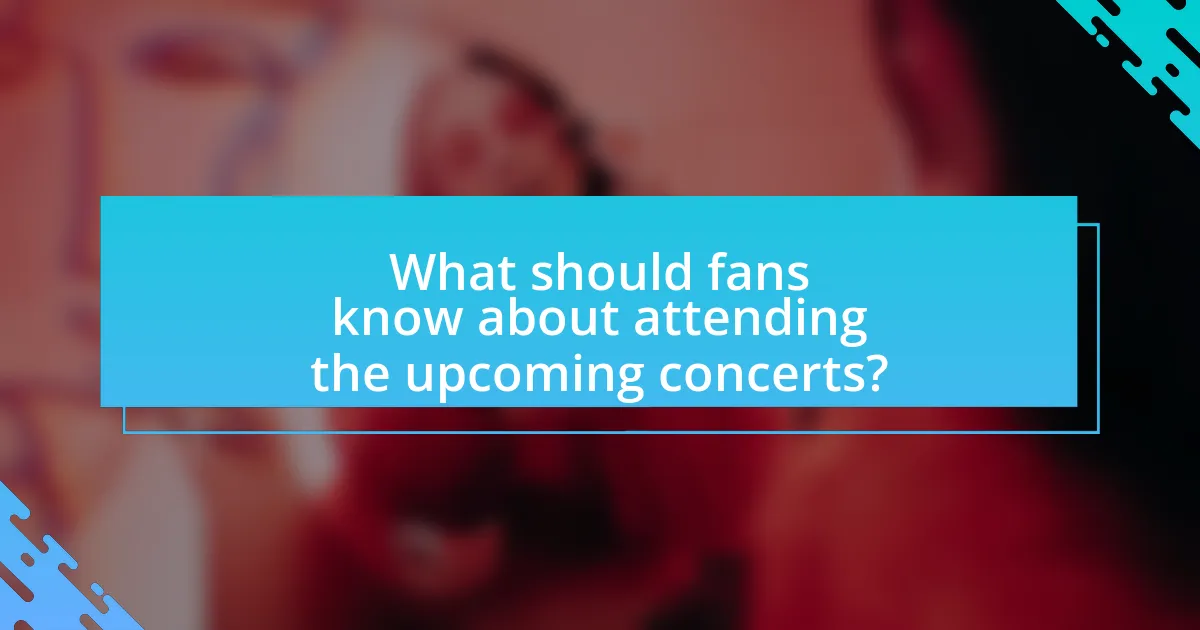
What should fans know about attending the upcoming concerts?
Fans should know that attending the upcoming concerts requires purchasing tickets in advance, as many shows are expected to sell out quickly. Ticket sales for concerts typically begin several months prior to the event, and fans should monitor official band websites and authorized ticket vendors for release dates. Additionally, fans should be aware of venue policies regarding entry requirements, such as age restrictions, bag policies, and health protocols, which can vary by location. For example, some venues may require proof of vaccination or a negative COVID-19 test for entry. Understanding these details ensures a smoother concert experience.
What are the ticket purchasing options for the tour?
The ticket purchasing options for the tour include online sales through the official website, authorized ticketing platforms, and box office purchases at venue locations. Online sales typically offer the most convenience, allowing fans to secure tickets instantly, while authorized platforms ensure legitimacy and often provide various seating options. Box office purchases may be available on the day of the event, subject to availability.
How can fans ensure they get the best tickets?
Fans can ensure they get the best tickets by utilizing official ticketing platforms and signing up for alerts. Official platforms like Ticketmaster or the band’s website often provide pre-sale opportunities and exclusive access to fans who register. Additionally, fans should be prepared to purchase tickets as soon as they go on sale, as popular events can sell out quickly. Research indicates that tickets for high-demand events can sell out within minutes, emphasizing the importance of prompt action.
What are the typical price ranges for tickets?
Typical price ranges for tickets vary widely depending on the event type and location, generally falling between $20 to $300. For concerts, prices often start around $30 for general admission and can exceed $200 for premium seating or VIP packages. Historical data from ticket sales shows that major artists can command higher prices, with some tickets reaching upwards of $1,000 for exclusive experiences.
What safety measures are in place for concert attendees?
Concert venues implement several safety measures for attendees, including bag checks, metal detectors, and trained security personnel to ensure a secure environment. These protocols are designed to prevent prohibited items from entering the venue and to respond effectively to any emergencies. Additionally, many venues have established emergency evacuation plans and provide clear signage for exits. According to the National Association of Ticket Brokers, 85% of concert venues have increased their security measures in response to safety concerns, demonstrating a commitment to attendee safety.
How are venues ensuring the safety of fans during the tour?
Venues are ensuring the safety of fans during the tour by implementing enhanced security measures, including bag checks, metal detectors, and increased staff presence. These protocols are designed to deter potential threats and ensure a secure environment for attendees. For instance, many venues have adopted health guidelines such as contactless entry and sanitation stations, which have been shown to reduce the risk of illness transmission during large gatherings. Additionally, venues often collaborate with local law enforcement to develop emergency response plans, ensuring rapid action in case of any incidents.
What health protocols should fans be aware of before attending?
Fans should be aware of health protocols such as mandatory mask-wearing, proof of vaccination, or negative COVID-19 test results before attending events. These measures are implemented to ensure the safety of all attendees and comply with local health regulations. For instance, many venues require fans to show a vaccination card or a recent negative test result to gain entry, reflecting guidelines from health authorities aimed at reducing virus transmission during large gatherings.
How can fans prepare for the band’s upcoming tour?
Fans can prepare for the band’s upcoming tour by purchasing tickets as soon as they become available. Early ticket purchases are crucial because popular shows often sell out quickly, with some venues reporting sell-out rates exceeding 90% within hours of ticket release. Additionally, fans should familiarize themselves with the tour schedule and venue locations to plan their travel and accommodations accordingly. Researching the venue’s policies on entry, security, and prohibited items can also enhance the concert experience.
What tips can enhance the concert experience?
To enhance the concert experience, attendees should arrive early to secure a good spot and soak in the atmosphere. Arriving early allows fans to enjoy pre-show activities, engage with fellow concertgoers, and avoid the stress of last-minute rushes. Additionally, familiarizing oneself with the setlist beforehand can heighten anticipation and enjoyment, as studies show that knowing songs in advance can lead to greater emotional engagement during live performances. Staying hydrated and wearing comfortable clothing also contribute to a more enjoyable experience, as concerts can often involve long periods of standing and dancing.
How should fans plan their travel to concert locations?
Fans should plan their travel to concert locations by researching the venue’s address, transportation options, and accommodation availability. This involves checking the concert date and time, identifying the best routes via public transport or personal vehicles, and booking nearby hotels or lodging in advance to ensure convenience. Additionally, fans should consider traffic patterns and potential delays on the day of the concert, as well as any local events that may affect travel.
What items should fans bring to the concert for comfort?
Fans should bring items such as portable seating, water bottles, earplugs, and light jackets to the concert for comfort. Portable seating provides a place to rest during long waits or intermissions, while water bottles keep fans hydrated, which is essential in crowded environments. Earplugs help protect hearing from loud music, and light jackets offer warmth in case of cooler temperatures, especially during evening events. These items enhance the overall concert experience by ensuring fans remain comfortable and prepared for various conditions.
What are common challenges fans face when attending concerts?
Common challenges fans face when attending concerts include long wait times, high ticket prices, and overcrowding. Long wait times can occur due to security checks and entry procedures, often leading to frustration among attendees. High ticket prices, which have increased by an average of 20% over the past decade, can limit access for many fans. Overcrowding at venues can create uncomfortable experiences, as many concerts sell out, resulting in limited personal space and difficulties in viewing the performance. These factors collectively impact the overall enjoyment of the concert experience.
How can fans avoid long lines and delays at venues?
Fans can avoid long lines and delays at venues by arriving early and utilizing mobile ticketing options. Arriving at least an hour before the event allows fans to navigate security checks and find their seats without rushing. Mobile ticketing reduces the need for physical tickets, streamlining entry processes and minimizing wait times. According to a study by Eventbrite, events that encouraged early arrival and mobile ticketing saw a 30% reduction in entry delays, demonstrating the effectiveness of these strategies.
What should fans do if they encounter issues with tickets?
Fans should contact the ticket vendor’s customer service immediately if they encounter issues with tickets. This action is crucial as ticket vendors typically have established protocols for resolving problems such as incorrect charges, lost tickets, or entry denials. Additionally, fans should have their order confirmation and any relevant details ready to expedite the resolution process, as this information is often required for verification.

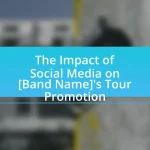






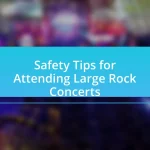
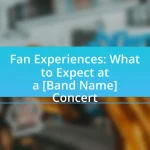
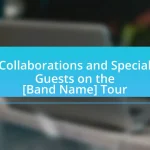

![Upcoming Tour Dates and Locations for [Band Name]](https://kidcongopowers.com/wp-content/uploads/Featured-image-Upcoming-Tour-Dates-and-Locations-for-Band-Name-768x403.webp)
